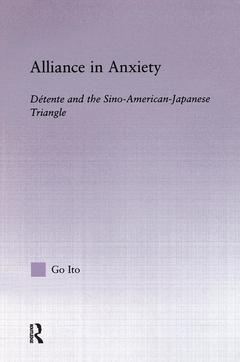Description
Alliance in Anxiety
Detente and the Sino-American-Japanese Triangle
Author: Ito Go Tsuyoshi
Language: English
Subject for Alliance in Anxiety:
Keywords
japanese; government; sato; cabinet; nixon; administration; sino; soviet; split; shock; Sato Cabinet; Nixon Shock; Nixon's Announcement; Federal Republic Of Germany; LDP; MITI; MOF; Nixon Administration; Sino Japanese Normalization; Alliance Dilemma; Okinawa Reversion; post-Cold War East Asia; PRC Government; Romantic Triangle; North Vietnam; Smithsonian Conference; Sino Japanese Relations; Japanese Leaders; Japan's Normalization; Negative Relationship; MOF Official; Chinese Government; North Vietnamese Government; International Systemic Approaches; Adversary Game
Publication date: 01-2019
· 15.2x22.9 cm · Paperback
Publication date: 05-2003
160 p. · 15.2x22.9 cm · Hardback
Description
/li>Contents
/li>Biography
/li>Comment
/li>
1. Introduction: Détente and the Sino-American-Japanese Triangle 2. The Alliance Dilemma and the Structural Dynamics of Triangles 3. The Emergence of the Sino-American-Japanese "Romantic Triangle" 4. Japanese Economic Submission to the United States: A Response to the "Alliance Dilemma" 5. Sino-Japanese Normalization and the End of the American "Romantic Triangle" 6. Japan's Pursuit of Independence in Foreign Policy: A New Response to the "Alliance Dilemma" 7. Conclusion: An Analogy of the Triangle Between the Détente Period and Today




